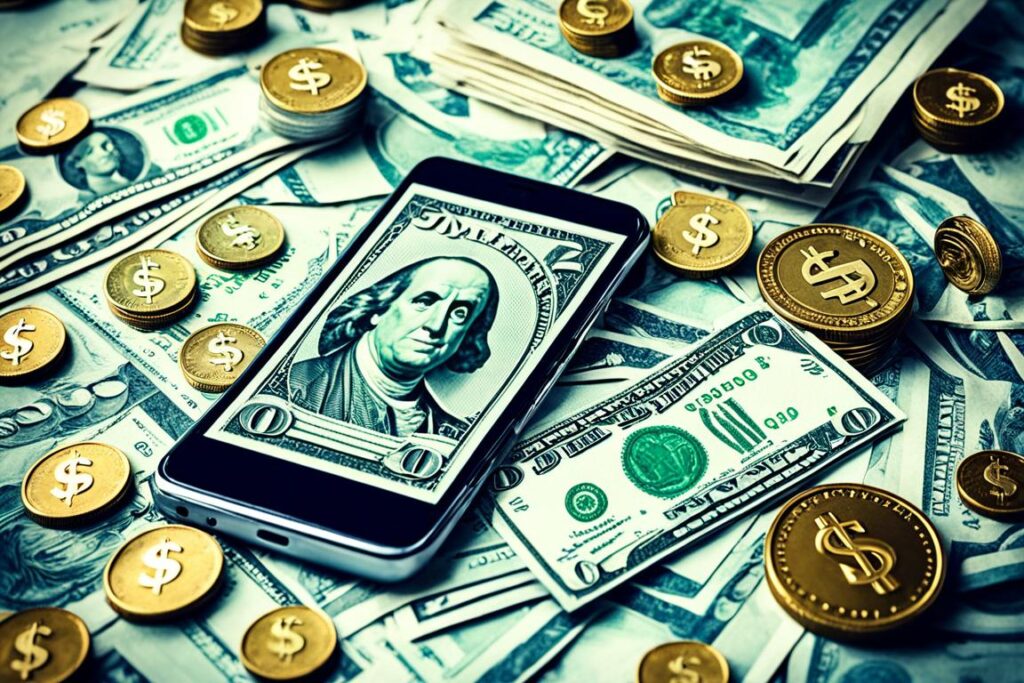Best Money Apps for Easy Financial Management

Running your finances can seem tough. You have to keep an eye on lots of costs, stick to budgets, and aim to reach your money goals. Luckily, there’s a way to make things easier – money apps!
Money apps are like personal finance wizards. They help you grab the reins of your money and make managing it simple. No matter if you want to set budgets, watch spending, or prepare for the future, a perfect money app is out there.
In 2024, according to Forbes Advisor, top money apps for easy financial control include YNAB (You Need A Budget), Empower Personal Dashboard™, Goodbudget, and PocketGuard. Also, apps like Oportun (formerly Digit), Stash, Honeydue, Monarch Money, Copilot, and Rocket Money shine. They bring cool tools like setting money goals, keeping an eye on your total worth, using an old but gold method called envelope budgeting, and stress-free saving. Plus, they can even help you invest without fuss.
Key Takeaways:
- Money apps ease the headache in handling personal finance.
- Top money apps in 2024 for smooth financial management include YNAB, Empower Personal Dashboard™, Goodbudget, and PocketGuard.
- These cool apps allow goal setting, tracking expenses, and automatic investing.
- They aid in staying within budget, watching spending, and meeting money goals.
- For the best results, pick a money app that’s just right for what you need and where you want to go.
Importance of Budgeting
Budgeting is key to financial stability and breaking away from financial woes. In our world, where the costs of living and healthcare are high, a strong budget is vital. It helps reduce stress about money and allows for wiser financial choices.
With a budget, you can easily track your income, spending, savings, and what you put towards retirement. This tracking lets you set and meet your money goals, matching your spending to your plan. It acts like a map toward financial stability, keeping you from falling into debt or stress.
Budgeting helps set a financial plan. It makes aiming for big money goals, like buying a house or getting out of debt, simpler. A budget ensures money goes where it should, making these goals more reachable.
Also, budgeting reveals your true financial situation. It shows where you might be spending too much or places you can cut back. This knowledge spurs wise choices and gives you the power to shape your financial future.
Peace of mind is another big win from budgeting. It means having a plan and working towards your financial dreams. Plus, it’s about being ready for the unexpected by saving for a rainy day.
It’s not just you that benefits from budgeting but your family too. It encourages talks about money, sets common financial dreams, and pushes everyone to spend and save wisely.
So, budgeting is a must for a stable financial life and a higher quality of living. With a budget, you can expertly handle your money, focus on your goals, and choose well with your finances. You can make a budget by hand, use an app, or get advice from a finance expert. No matter how you do it, taking charge of your money through budgeting is a smart step for a better financial tomorrow.
How To Create a Budget
Creating a budget is key to financial success. It lays down a path to stable finances and reaching your saving goals. Here’s how to build an effective budget:
Step 1: Identify Your Income and Expenses
First, look at what you earn and spend. You can use a budgeting app that links to your bank, or do it manually. It’s important to know this to create a realistic budget.
Step 2: Categorize Your Expenses
Then, split your costs into fixed and variable. Fixed ones stay about the same, like for your home, bills, and debts. Variable costs change each month, like food, fun, and travel. This sorting helps you manage your money better.
Step 3: Set Savings Goals
Don’t forget to plan for saving. Choose what you’re saving for – it could be retirement, an emergency, or something you really want. It’s essential to fit saving into your budget.
These steps help you make a detailed budget that covers all your needs and saving aims. A budget gives you a clear financial picture and helps you make smart money choices.
| Budget Categories | Description |
|---|---|
| Income | The total amount of money you earn, including wages, salaries, and additional sources of income. |
| Fixed Expenses | Recurring expenses that remain relatively constant each month, such as rent/mortgage, utilities, insurance, and loan payments. |
| Variable Expenses | Expenses that can vary from month to month, such as groceries, transportation, entertainment, and dining out. |
| Savings Goals | The specific financial objectives you want to achieve, such as saving for retirement, an emergency fund, or a down payment on a house. |
Budgeting for Specific Expenses
Budgeting for specific expenses needs smart planning. By putting money where it matters & saving well, people can hit their money goals.
Budgeting for Groceries
Planning your grocery spending is key to saving money. Look at the USDA’s food plan for ideas. It’s good for various budgets and family sizes. Also, plan meals ahead and buy in bulk to cut costs.
Budgeting for a Vacation
To plan a vacation, decide how much you’ll spend and save monthly. Keep a special savings account just for your trip. This way, you can see your savings grow and make sure you have enough for your vacation.
Budgeting for Rent
For rent, follow the 28/36 rule. It says not to spend more than 28% of your income on housing before taxes. Sticking to this keeps you financially healthy while you have a good place to live.
Budgeting for a Wedding
Weddings need a clear budget and to know who’s paying. Decide how much you’ll spend based on what you can afford. Then, think about who will help pay for what, like the venue, food, or photos.
Budgeting tip: Regularly check and tweak your budget. This keeps you on the path to meeting your financial aims.

Tips for Budgeting for Specific Expenses
| Expense | Tips |
|---|---|
| Groceries | – Compare expenses to USDA’s food plan – Practice meal planning and bulk buying |
| Vacation | – Set a spending goal and save a specific amount each month – Create a dedicated savings account for vacation funds |
| Rent | – Follow the 28/36 rule: Allocate no more than 28% of pre-tax income towards housing expenses |
| Wedding | – Determine a budget and identify contributors – Allocate funds to different wedding expenses |
Understanding Budgeting Apps
Budgeting apps are key in managing personal finance well. They give a central spot to track income, expenses, saving goals, and cash flow. They also handle bill payments, set goals, and offer financial reports. This makes budget creation and management a lot easier.
Using a budget app, you see your money picture clearly. This helps make smart choices to meet financial goals. These apps are great for building better money habits, making the most of your finance journey.
Budget apps show a clear view of your money coming and going. They promote checking your money often and looking into it deeply. Knowing your spending better helps you spot where to improve for a more stable financial future.
Plus, you can use budget apps to set and follow your financial dreams. Whether it’s the dream vacation, clearing debt, or retirement planning, these apps help you watch how you’re doing. They keep you focused on reaching your money goals.
One great thing about budgeting apps is how easy they are to use and find. Thanks to new tech, budget apps work on phones, tablets, and computers. This means you can see your money info whenever and wherever. It helps you keep better track of your financial health.
| Benefits of Budgeting Apps | Drawbacks of Budgeting Apps |
|---|---|
|
|
Pros and Cons of Budgeting Apps
Budgeting apps help with managing money well. They sync all our accounts to see our complete finances. This makes tracking what we spend and earn easier. Budgeting apps are also great for setting and watching our money goals. And they are easy to use on our phones, so we can budget on the go.
They save time by doing a lot of the budget work for us. Budgeting apps figure out our budget, sort our expenses, and handle our money moves. This means we don’t have to do as much by hand. It’s a big help in keeping our budget on track without the hassle of a lot of manual work.
Yet, budgeting apps do have a few downsides. Their desktop versions might not work as well as their mobile ones. And some people might find them hard to understand at first. It can take a little time to learn how to use all the app’s features fully.
Even with these issues, budgeting apps bring a lot of value and make managing money simpler for many people.
| Pros of Budgeting Apps | Cons of Budgeting Apps |
|---|---|
| Syncing multiple accounts for a comprehensive overview of finances | Limited desktop availability compared to mobile versions |
| Easy goal setting and tracking progress | User interface may be less intuitive or user-friendly |
| Convenience and accessibility through mobile devices | |
| Automation for time-saving budget management |
Budgeting apps become a go-to place for managing money. They let us watch what we spend and save. While they may not be perfect, the benefits of using these apps are usually greater than the downsides.
Choosing the Right Budgeting App
When picking a budgeting app, think about what you really want and need. Consider things like the app’s features, how safe it keeps your information, and if it can connect with your bank accounts.
App Features
Look at what the budgeting app can do first. Check if it has tools for setting money goals, managing bills, and tracking investments. These tools are key to making your budgeting efforts work well and help you reach your money goals.
Security
Keeping your financial info safe is super important. Make sure the app you choose has strong privacy safeguards in place. This means it should use good encryption, offer two-step verification, and have clear privacy rules. A secure app gives you peace of mind and protects your data from anyone else.
Account Integration
Since many people have accounts at different places, a vital feature is account syncing. This means the app can pull in information from all your accounts. With this feature, you get a complete picture of your money situation in one spot. It helps to manage budgets better and keep your spending, income, and saving info up to date across all your accounts.
Considering these aspects can help you find a budgeting app that fits your money goals. Whether you want to keep track of spending, set savings milestones, or have a better understanding of your financial trends, the right app is essential for your financial success. In following parts, we’ll check out other budgeting methods for those not keen on using apps.

Alternatives to Budgeting Apps
Budgeting apps are handy, but not everyone likes to use them. Fortunately, there are other ways to manage your money. These methods can help anyone control their cash without an app.
Manual Budgeting
Have you thought about budgeting by hand? You can jot things down with paper and a pen or use a computer. Doing it this way lets you really customize your plan. You get a closer look at what you’re making and spending. Plus, you can easily tweak the plan as you go.
There’s also the spreadsheet option. It’s like having a digital notepad for your budget. Spreadsheets let you use cool tools to keep track over time. And, you can quickly see how changes affect your money.
Seeking Advice from Financial Advisors
Looking into financial advice is another choice. Financial advisors are there to offer their wisdom. They can help set up a detailed money plan for you. This includes smart choices for investing and tips for tricky money moves.
Working with an advisor can boost your confidence. It makes reaching your financial dreams seem more doable. They’re there to guide you every step of the way.
| Method | Advantages | Disadvantages |
|---|---|---|
| Manual Budgeting |
|
|
| Financial Advisors |
|
|
Deciding between apps and other options depends on what you like and your money goals. Manual budgeting and advisor help both have good and bad points.
So, pick the one that suits you best. Choose the method that helps you reach your financial goals. It’s all about what works for you.
Evaluating the Worth of Budgeting Apps
Budgeting apps are great for managing money better. They have many features. These include tracking spending, setting goals, and managing budgets automatically. This improves how people handle their money and their financial outcomes. Apps help users see their spending habits clearly, make smart choices, and reach their money goals.
Are budgeting apps worth it? Some may cost money to use. But the benefits and time they save can be more valuable. Here’s what to look at:
- Financial Benefits: These apps let users see where they spend too much. This helps cut spending and save more. The result is better financial health.
- Time Savings: Apps do lots of money managing work for you. They categorize expenses and keep track of transactions. So, you save time to do other things.
- Financial Management: Budgeting apps are like a one-stop place for finances. They show your money coming in, going out, and savings. This info helps make smarter money choices and meet financial goals.
- User Experience: Every app feels and looks different. Think about how easy an app is to use and if it helps reach your financial goals. Reviews and comparing features can help pick the right app.
Picking the right budgeting app is about your needs and goals. While apps offer many good things, choosing the best one is key. It must be something you like and meet your needs for money management.
Pros and Cons of Budgeting Apps
| Pros | Cons |
|---|---|
| Automated expense tracking | Limited desktop availability |
| Goal setting and progress tracking | Potential subscription fees |
| Convenient accessibility | Less user-friendly desktop versions |
| Improved financial decision-making | Varied user experiences |
When looking at budgeting apps, think about the money benefits, time saved, and management tools. Also, how you like using the app matters a lot. It should fit your financial path well.
Additional Financial Tips and Strategies
Budgeting apps are great, but there’s more to improving your finance. Consider these tips for better money management:
Budgeting for Beginners
Starting a budget is key, especially for beginners. Track your money in and out, sorting it as fixed or flexible. This shows where you spend most and where cuts are possible.
Financial Automation
Automate payments and saving to make finance easier. Use tools to pay bills on time and set up a saving account. This prevents late fees and improves time management.
Personal Finance Growth
Investing in your future is vital for growth. Look into various investment types to spread your money for better rewards and lower risk. Start small and learn about investing to make good choices.
Effective Investment Strategies
Choosing the right investment strategies is important for long-term success. Dollar-cost averaging and regularly checking your investments are smart. These keep your money growing without too much risk.
Trying these tips can boost your money skills and get you closer to your finance dreams.
| Financial Tips and Strategies | Description |
|---|---|
| Budgeting for Beginners | Start with a budgeting plan suited for beginners, track income and expenses, and categorize them for better financial awareness. |
| Financial Automation | Automate bill payments and savings contributions to save time and ensure timely payments. |
| Personal Finance Growth | Focus on investing and diversify your portfolio to grow your personal finance. |
| Effective Investment Strategies | Implement strategies like dollar-cost averaging and regular portfolio review to maximize returns and minimize risk. |
Conclusion and Future Trends in Money Apps
Money apps have made big strides in the last few years. This is due to fintech progress. They keep getting better, offering more features. The future of money apps looks bright, with cool trends coming.
Apps are joining forces with digital banking. This lets users handle all their money matters in one spot. Soon, apps will do more of the work for us. For example, they could pay bills or manage savings without us needing to do anything.
Keeping our money safe is a big deal for the future. With tech getting better, protecting our info is a top concern. Soon, we’ll see extra safe ways to log in, more hidden ways to keep data safe.
Money apps of the future will be easier to use and very helpful. It’s important for users to know what’s next. Checking if our apps are still the best choice is key. This way, we can use new features that fit our financial goals.
Source Links
- https://www.pcmag.com/picks/the-best-personal-finance-services
- https://www.forbes.com/advisor/banking/best-budgeting-apps/
- https://fortune.com/recommends/banking/best-budgeting-apps/